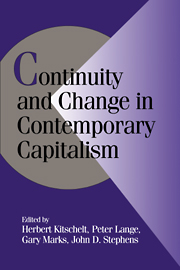Book contents
- Frontmatter
- Contents
- List of Contributors
- Preface
- Introduction
- PART I THE INTERNATIONAL SETTING FOR POLITICAL-ECONOMIC STRATEGIES
- PART II THE DYNAMICS OF DOMESTIC POLITICAL ECONOMIES
- PART III POLITICAL ECONOMY AND DEMOCRATIC COMPETITION
- PART IV CONCLUSION
- 15 Convergence and Divergence in Advanced Capitalist Democracies
- References
- Index
- Title in the series
15 - Convergence and Divergence in Advanced Capitalist Democracies
Published online by Cambridge University Press: 05 June 2012
- Frontmatter
- Contents
- List of Contributors
- Preface
- Introduction
- PART I THE INTERNATIONAL SETTING FOR POLITICAL-ECONOMIC STRATEGIES
- PART II THE DYNAMICS OF DOMESTIC POLITICAL ECONOMIES
- PART III POLITICAL ECONOMY AND DEMOCRATIC COMPETITION
- PART IV CONCLUSION
- 15 Convergence and Divergence in Advanced Capitalist Democracies
- References
- Index
- Title in the series
Summary
Generic concepts such as market economy, capitalism, or democracy conceal as much as they reveal about the ways scarce resources and life chances are allocated in advanced industrial societies. One message the contributions to this volume bring across loud and clear is the need to pay attention to variation in institutional patterns of political and economic governance across wealthy Western countries. This is an insight that goes back at least as far as Shonfield's (1969) seminal study of the interaction between politics and economics in capitalist core countries during the decades of recovery after World War II. It is still true today.
For us, and for the contributors to this volume, however, the task of characterizing contemporary capitalism at the end of the twentieth century is more complicated than merely reaffirming cross-sectional patterns of political economic variation. Our most challenging task today is to determine how these patterns of variation, locked in through intricate pathways of industrialization and democratization, are shaped by growing global interdependence and domestic political and socioeconomic change. To what extent are capitalist countries and regions maintaining their “path-dependent” trajectories? Are there pressures toward greater institutional and policy convergence? And even if there are, are there also continuing and new sources of diversity? We want, in other words, to explore not only how the earlier diversity is, and is not, changing but also causal processes behind the emerging patterns.
- Type
- Chapter
- Information
- Continuity and Change in Contemporary Capitalism , pp. 427 - 460Publisher: Cambridge University PressPrint publication year: 1999
- 62
- Cited by

